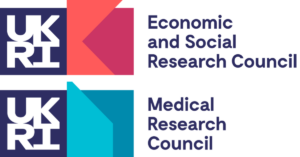Population Research UK - Skills Development for Managing Longitudinal Data for Sharing
About the project
This project aimed to enhance and expand the skills and expertise available to support the broader sharing and increased usage of Longitudinal Population Studies (LPS) data resources.
Providing training and support for social sciences data producers and owners has deepened our understanding of the challenges and barriers in social science data sharing. Traditionally the UK Data Service takes a proactive approach in preparing research data management training materials: engaging with the target audience, understanding challenges, setting clear and concise objectives and considering feedback and adapting training as and if needed. A similar proactive approach has been employed for this project. This helped develop our understanding of biomedical-specific data sharing barriers. We have built on existing knowledge and prepared further training materials to be used within the LPS community across social and biomedical sciences.
The project ran from October 2023 to March 2025.
Background
The principal LPS funders in the UK, the Economic and Social Research Council (ESRC), the Medical Research Council (MRC), and Wellcome, have been working together on how to support activities to further increase the use and value of longitudinal studies that generate population data. In November 2020, the three funders commissioned Health Data Research UK (HDRUK) to undertake a ‘Design and Dialogue’ scoping phase, involving extensive consultation with data users and those running data investments. This resulted in a prospectus (published December 2021) that helped guide activities needed to maximise LPS data use across disciplines through a planned ESRC and MRC joint investment, known as Population Research UK (PRUK).
Population Research UK (PRUK) is a new national resource designed to maximise the use of, and benefits from, UK longitudinal population studies across social, economic and biomedical science. Population Research UK is funded by the UK Research and Innovation (UKRI) Infrastructure Fund.
ESRC and MRC, part of UK Research and Innovation (UKRI), commissioned activities to inform and help address some critical challenges and opportunities facing the LPS community in preparation of the PRUK launch. They invited a proposal from the UK Data Service to expand and enhance the current training provision for LPS data resource management for sharing, with reference to the funders’ Research Data Policies.
Project members
Joanne Webb, Cristina Magder, Sharon Bolton, Hina Zahid, Beate Lichtwardt, Liz Smy, Gail Howell, Finn Dymond-Green.
Contact
If you would like to get in touch about the project please email datasharing@ukdataservice.ac.uk.
Key activities and outputs
The project focused on building capacity through practical, user-focused training in key data management areas such as data cleaning, documentation, metadata and anonymisation, and focused content on synthetic data and machine-assisted harmonisation. A suite of high-quality training and dissemination resources was developed to support data managers and institutions across LPS community.
All training materials have been made freely available under Creative Commons licences to maximise accessibility, reuse, and long-term impact.
The project’s outcomes and recommended next steps are captured in a detailed evaluation and impact report, which summarises the activities undertaken, lessons learned, participant feedback, and recommendations for future training initiatives.
The project has been shared at key conferences, including the Society for Longitudinal and Life Course Studies (SLLS) in 2024, and will continue to be presented at relevant events. Links to presentations and published outputs will be added as they become available.
Training materials
PRUK UKDS: Introductory Research Data Management Course – Enhancing Longitudinal Data Sharing
PRUK UKDS: Introduction to Synthetic Data for Longitudinal Data Managers Workshop
PRUK UKDS: Transforming data management with the Harmony Data Tool: A hands-on introduction
Evaluation and impact report
Conference contributions

